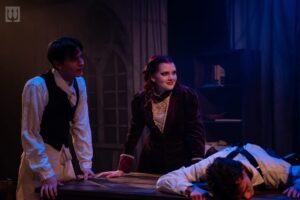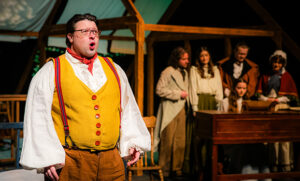In every situation where I have excelled and felt empowered, encouraged and infused with a strong sense of my own potential, my inspiration has been drawn from those who are older, and more experienced, and whose work excites me and makes me want to learn and to be better. I may get into trouble for saying this so candidly, but even so, here it is: the institution that I currently attend makes me feel like I am merely fulfilling the scholarly component of my life (going through the motions as solely a means to an end in a vacuum of “No, you can’t”- and role models are a diamond in the rough.
So rarely do I hear of PhD students reaching out beyond the Drama Centre, possibly because it is mildly discouraged, and the fissure between the academic study of drama and the practice of creating theatre there is so wide a small planet could fit between them. One of the few exceptions I have is Chris Jackman, who works diligently to find the balance between his scholarship and his practical goals. His most recent project is Jacques Brel is Alive and Well and Living in Paris, which he directed and is playing at the Cameron House until Saturday March 28th, 2009 with his newly found theatre company open corps. For this alone, I give Chris Jackman props and encourage him to continue to forge his path in the theatre community wherever his curiosity takes him.
Jacques Brel is Alive and Well and Living in Paris is an American revue of the songs of Belgium singer/songwriter Jacques Brel which debut at the Village Gate Theatre in Greenwich Village in 1968 to moderate success, and enjoyed subsequent international revivals. It is a difficult show to tackle. There seems to me to be three successful ways to elevate a string of songs from being a concert (or recital), to being a musical. The first is to write a story which uses only song to tell a linear story, as we can see in a show like Les Misérables or Rent. There are also shows like Cats that tell a rather narrative story, but rely on things like dance to give them strength. The second is to write a song cycle, like Elegies or Songs for a New World, which does not have a single story, or concrete characters, but nevertheless explores a clear theme, with a clear arc that culminates into a sort of through line. The third is to take a bunch of random songs written by a celebrated figure and to force connections upon them by writing a script that somehow weaves them all together in a linear way. Mamma Mia! and We Will Rock You are two such examples. Jacques Brel is Alive and Well and Living in Paris tries to present the random songs written by a celebrated artist without a libretto, but the sense of drive, the through line or theme, is never there.
I think I can imagine this show working in the hands of an experienced group of well-known Cabaret singers, as they have learned how to tell a story entirely through song, how to create honest, clear, unique characters entirely without context and how to express a myriad of sometimes contradictory motivations, objectives and emotions while belting their faces off seamlessly. And that can be one of the most difficult things to ask of a performer. Sharron Matthews is a master at it, but talent like hers is unique.
In Jackman’s show, I got a strong sense of the performers performing. They all have good voices (and they play their own instruments), and I found the general ambiance to be very Brechtian, as every cliché of musical theatre was on boisterous display and I wasn’t sure why. I could see the singers singing, I could see the actors trying to illicit the emotion, but I only got one brief glimpse of an actor just being, once in the song “Jackie.” I know Jackman is supremely interested in process, and so I find it very interesting that his show makes the audience so aware of the wheels turning and of the work being done, but without a context of a story, or even a theme, the political or social potential of the Verfremdungseffekt has nothing to latch hold of.
As an introduction to Brel, this show has piqued my interest in his work and I find that I have a newfound appreciation for how difficult cabaret can be, and how integral those transitions between text and song can be for the actor to get her bearings. I wish I knew more about Jackman’s process and what he was interested in discovering or exploring, but it seems like the biggest obstacle this show faces is this revue’s reliance on the performers’ absolute command of the cabaret genre, which doesn’t lend itself well to young artistic academics trying to learn.
Jacques Brel is Alive and Well and Living in Paris plays at the Cameron House until Saturday March 28th, 2009. 408 Queen Street West (at Spadina). Doors at 7:30. Show at 7:45pm. Tickets are $20.00 ($15.00 for students) and to reserve please email jacquesbreltoronto@gmail.com
So rarely do I hear of PhD students reaching out beyond the Drama Centre, possibly because it is mildly discouraged, and the fissure between the academic study of drama and the practice of creating theatre there is so wide a small planet could fit between them. One of the few exceptions I have is Chris Jackman, who works diligently to find the balance between his scholarship and his practical goals. His most recent project is Jacques Brel is Alive and Well and Living in Paris, which he directed and is playing at the Cameron House until Saturday March 28th, 2009 with his newly found theatre company open corps. For this alone, I give Chris Jackman props and encourage him to continue to forge his path in the theatre community wherever his curiosity takes him.
Jacques Brel is Alive and Well and Living in Paris is an American revue of the songs of Belgium singer/songwriter Jacques Brel which debut at the Village Gate Theatre in Greenwich Village in 1968 to moderate success, and enjoyed subsequent international revivals. It is a difficult show to tackle. There seems to me to be three successful ways to elevate a string of songs from being a concert (or recital), to being a musical. The first is to write a story which uses only song to tell a linear story, as we can see in a show like Les Misérables or Rent. There are also shows like Cats that tell a rather narrative story, but rely on things like dance to give them strength. The second is to write a song cycle, like Elegies or Songs for a New World, which does not have a single story, or concrete characters, but nevertheless explores a clear theme, with a clear arc that culminates into a sort of through line. The third is to take a bunch of random songs written by a celebrated figure and to force connections upon them by writing a script that somehow weaves them all together in a linear way. Mamma Mia! and We Will Rock You are two such examples. Jacques Brel is Alive and Well and Living in Paris tries to present the random songs written by a celebrated artist without a libretto, but the sense of drive, the through line or theme, is never there.
I think I can imagine this show working in the hands of an experienced group of well-known Cabaret singers, as they have learned how to tell a story entirely through song, how to create honest, clear, unique characters entirely without context and how to express a myriad of sometimes contradictory motivations, objectives and emotions while belting their faces off seamlessly. And that can be one of the most difficult things to ask of a performer. Sharron Matthews is a master at it, but talent like hers is unique.
In Jackman’s show, I got a strong sense of the performers performing. They all have good voices (and they play their own instruments), and I found the general ambiance to be very Brechtian, as every cliché of musical theatre was on boisterous display and I wasn’t sure why. I could see the singers singing, I could see the actors trying to illicit the emotion, but I only got one brief glimpse of an actor just being, once in the song “Jackie.” I know Jackman is supremely interested in process, and so I find it very interesting that his show makes the audience so aware of the wheels turning and of the work being done, but without a context of a story, or even a theme, the political or social potential of the Verfremdungseffekt has nothing to latch hold of.
As an introduction to Brel, this show has piqued my interest in his work and I find that I have a newfound appreciation for how difficult cabaret can be, and how integral those transitions between text and song can be for the actor to get her bearings. I wish I knew more about Jackman’s process and what he was interested in discovering or exploring, but it seems like the biggest obstacle this show faces is this revue’s reliance on the performers’ absolute command of the cabaret genre, which doesn’t lend itself well to young artistic academics trying to learn.
Jacques Brel is Alive and Well and Living in Paris plays at the Cameron House until Saturday March 28th, 2009. 408 Queen Street West (at Spadina). Doors at 7:30. Show at 7:45pm. Tickets are $20.00 ($15.00 for students) and to reserve please email jacquesbreltoronto@gmail.com






